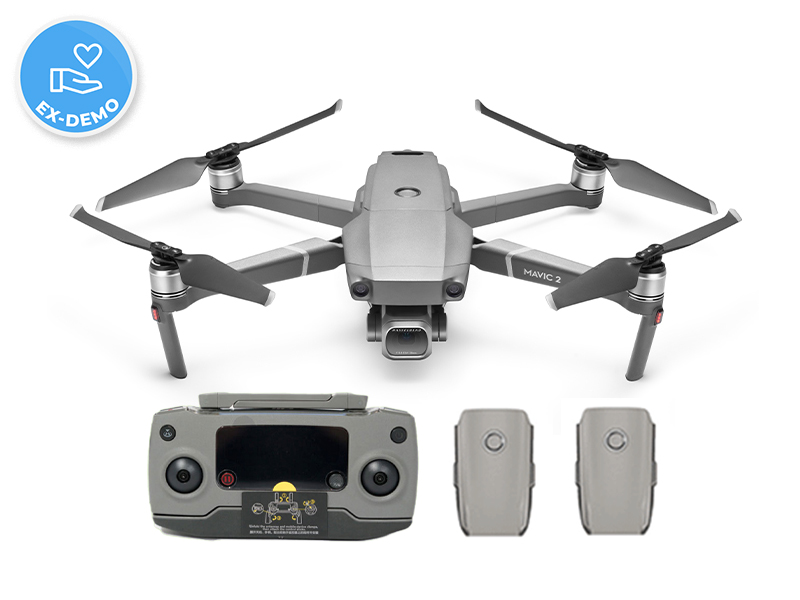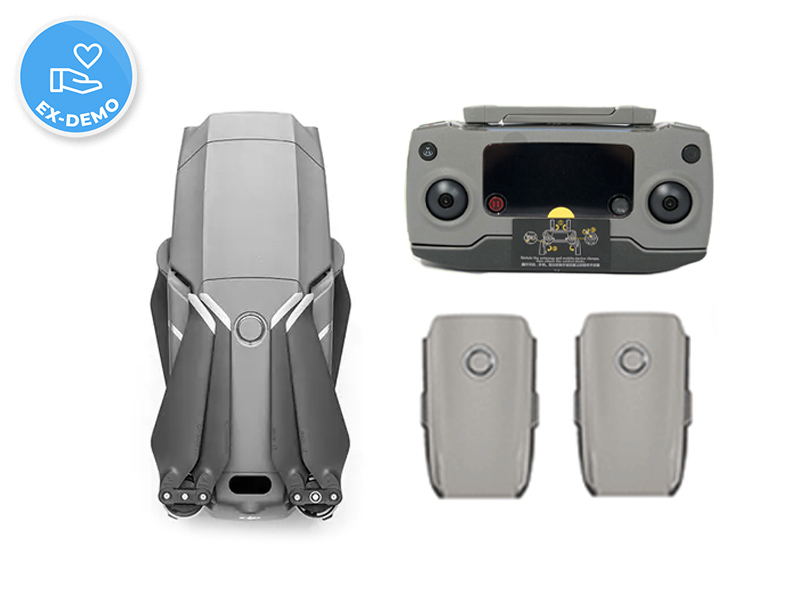


The only difference between both editions is their respective gimbal cameras. However, by purchasing the Mavic 2 Gimbal Camera Replacement Service in ONLINE REPAIR REQUEST page, you have the option to replace your gimbal camera with the other version by sending it to the DJI After-Sales Team.
The Mavic 2 is an improvement in almost all aspects over the Mavic Pro including camera performance, video transmission, fight time, flight speed, low-noise, omnidirectional obstacle sensing, intelligent functions, and its unique Hyperlapse feature.
The Mavic 2 supports DJI Goggles version 01.04.0500 (or later versions) and DJI Goggles RE version 01.00.0600 (or later versions). Please note that DJI Goggles only support a 2.4 GHz frequency band, while DJI Goggles RE supports both 2.4 and 5.8 GHz frequency bands for enhanced connectivity.
No.
The Mavic 2 Pro comes equipped with the all-new Hasselblad L1D-20c camera. The brand new 1-inch CMOS sensor has an active sensing area four times more effective than the original Mavic Pro. The large sensor also means better performance in low-light environments with a more extensive ISO range, and max ISO lifted from 3200 to 12800.
The Mavic 2 Zoom is all about dynamic perspectives and is powered by a 1/2.3 inch 12-megapixel sensor with up to four-times zoom, including a two-times optical zoom (24mm–48mm) for more creative aerial photography options.
DJI and Hasselblad have spent the last two years in collaboration making the L1D-20c camera, co-developing attributes such as lens definition, image processing engine, and image effect optimization, to make a Hasselblad quality camera small enough to fit on the new Mavic 2 Pro. The L1D-20c also possesses Hasselblad’s unique Hasselblad Natural Colour Solution (HNCS) technology, helping users to capture gorgeous 20-megapixel aerial shots in stunning color detail.
The Mavic 2 Pro is capable of recording 3840×2160 10-bit 4K Dlog-M and 4K HDR 10-bit videos at 100 Mbps.
The Mavic 2 Zoom's 24–48 mm optical zoom camera supports shooting at 4× lossless zoom 1080p video.
No. However, you can do this in Head Tracking mode with the DJI Goggles series.
The Mavic 2's gimbal structure is optimized for increased stiffness, meaning that the camera is unable to rotate the full 90° needed to shoot vertically. However, you can choose the Vertical Mode in Panorama to get a stitched vertical photo.
Dlog-M is only available on the Mavic 2 Pro because the pro version was designed with the needs of professional photographers in mind, meeting demands for greater color correction capabilities.
On the other hand, the Mavic 2 Zoom has D-Cinelike to realize quick and easy color correction. Along with Dlog-M, D-Cinelike reserves more highlight and color information than any normal color correction mode, leaving more room for post-processing.
No.
Full FOV down samples from the 5.7K sensor to 4K resolution while HQ crops in the center for finer image quality but less FOV. Full FOV view is 75° and HQ view is 55°. You can select between them according to your actual shooting demands..
No.
Go to Camera Settings and tap the ‘Save Original’ button. You can select to save the original photos of the Hyperlapse video in either JPEG or RAW format. In ‘Storage Location’ you can choose to keep them on the Micro SD card or the internal storage.
18 km in extreme testing environments measured in 50.4 kph windless conditions down to 0% battery. However, be sure to keep enough battery during flights for a safe return.
The Mavic 2 can resist up to level 5 winds on the Beaufort scale.
No, the sizes are different, and therefore cannot be used on the Mavic Pro Platinum.
The Mavic 2's rotor system is optimized primarily for forward flight. Thanks to its more aerodynamic airframe, the Mavic 2 consumes less power at certain forward flight speeds than when hovering. Therefore, the maximum hovering time is 29 minutes in environments with no wind while the maximum flight time can be up to 31 minutes flying at a constant speed in conditions with no wind.
Omnidirectional Obstacle Sensing includes left/right, up/down, and forward/backward obstacle sensing. Sensing for left/right directions is only available in ActiveTrack or Tripod Mode.
Note: Omnidirectional Obstacle Sensing does not fully cover the circumference of a 360-degree arc. And the left and right obstacle sensing system only works in specific modes and environments. DJI warranty does not cover any loss caused by crashing when flying left or right, even when ActiveTrack or Tripod mode is activated. Please be aware of your surroundings and App notifications when operating the Mavic 2 to ensure safety.
Yes. The Mavic 2's default setting has auto LED enabled, which turns the Bottom Auxiliary Light on/off depending on the brightness of your environment. You can disable this feature in the app, and you can also manually turn on/off the Bottom Auxiliary Light in the app.
OcuSync 2.0 supports both 2.4 GHz and 5.8 GHz frequency bands, featuring stronger interference resistance and auto-switching capabilities to deliver 8 km 1080p video transmission feeds (unobstructed, free of interference, and when FCC compliant).
.120–130 ms, which is 40–50 ms shorter than the first generation.
No.
Currently, no. However, it will be possible soon.
You can use an ordinary USB cable to connect your smartphone to the remote controller via the USB port at the bottom of the controller (be sure to pull up the cable at the Micro USB port). This might, however, prove to be slightly inconvenient when flying the aircraft. Cables with different connectors come with the aircraft so you can choose the one most appropriate for you.
No. You can only control it using a remote controller.
Mobile phones that are 6.5–8.5 mm thick and no more than 160 mm long will fit in the remote controller clamps comfortably. We strongly recommend you to remove the protective cover before attaching your mobile phone. For tablets beyond this measurement range, please purchase the DJI Mavic 2 Tablet Holder.
No. The Battery Charging Hub charges batteries in sequence according to their power levels from high to low, avoiding the hassle of interchanging them while charging. Charging in sequence gives you a fully charged battery in the quickest possible way.
Approximately 1.5 hours.
It is recommended to fully charge the batteries at least once every three months.
No. If you do, the update will fail. You will then need to download the firmware and update it again.
Yes.
Connect the Mavic 2 to the DJI GO 4 app. The app will then check firmware compatibility automatically. You may upgrade according to the instructions.
No. You need to connect the remote controller with a USB cable and then power on to connect to DJI Assistant 2.
1. Low-battery level.
Before installing an update, make sure the battery level is above 50%.
2. Powering off the Mavic 2 or the remote controller during an update.
If this happens, restart the Mavic 2 and the remote controller, and begin the update again.
3. Internet was disconnected during the firmware download.
If the update failure persists, or the remote controller does not link with the aircraft, there may be firmware inconsistencies between devices. In this case, use DJI Assistant 2 on your computer to update the aircraft and the remote controller to the latest versions separately.
